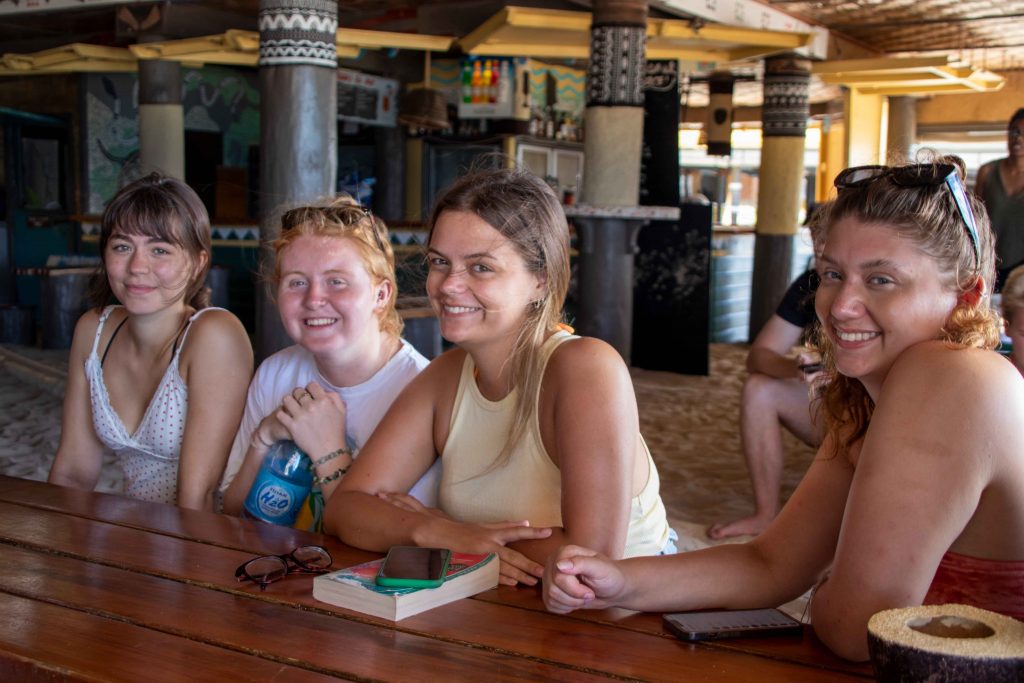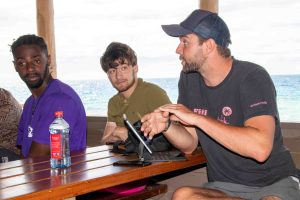

Students at the reflection session during the Think Pacific project on the Beachcomber Island.
A group of 21 international university students from the United Kingdom who are part of the Think Pacific’s Higher Education Mobility for the Turing Scheme met with staff and research students from the Fiji National University (FNU) where they engaged in discussions and shared their experiences about their visit.
FNU and the UK-based NGO Think Pacific signed a Memorandum of Understanding in May last year to support internships, mobility programmes and support collaborative activities. The partnership allows international university students to visit FNU campuses and to meet and engage with FNU students. The international university students also engage in discussions with FNU’s academics and research students and complete reflection summaries based upon challenges posed by the FNU academics.
Think Pacific’s programme aims to broaden the United Kingdom students’ cultural understanding, soft skills, and employability and foster a long-term understanding of key globalisation, sustainability, and civic responsibility issues. For the visit, students engaged in the questions and answers sessions on the themes of building resilient communities through health, education and Fiji, the South Pacific and Climate Change. The FNU staff who delivered in the session were Dr Odille Chang, Dr Gade Waqa, Dr Ravita Prasad, Dr Shipra Shah and Niranjwan Chettiar.
The programme challenges students to learn about global citizenship while providing truly unique study abroad and work experience that models the Turing Scheme’s core objectives and provides a unique offering to universities in order to align with the UK Government’s new foreign policy focus on the Asia Pacific region.
The FNU team also officiated in a reflection session with students from the University of Lincoln who shared their experiences and journey on staying in and exploring the village life.
FNU’s Pro Vice-Chancellor Learning and Teaching Professor Lisa Harrison said the presentations reflected a deep appreciation of the local culture and traditions.
“It is a fantastic learning initiative which encourages students to be immersed in local education systems and to experience local cultures and customs firsthand,” she said.
“During the reflection sessions, the students shared many interesting stories. It is always interesting to hear how their lived experience reflected their initial expectations, regardless of what they were told before the project.
“We cannot teach them everything because they must experience things for themselves, and this study trip was overwhelmingly a transformative experience.”
“As a university, we would like our local students to travel to the UK though this is cost prohibitive for many.”
As a result, we believe it would be more realistic to pair some of our students with the students who will be visiting. We want to continue working with Think Pacific and will provide full support for future projects. FNU is always looking for ways for students to connect with people, understand their daily lives, and help the University achieve its goal of providing students with a holistic learning environment.”

Think Pacific Briefing Leader, Jake Whitby talking to the participants at the reflection session at Beachcomber Island.
Jake Whitby, Think Pacific Briefing Leader, thanked the Fijian communities for allowing the organisation and the students to work and learn from them.
“The students had a good time and experienced a culture with, perhaps, less physical material things than they are used to in their lives back home. The values and the Fijian culture and custom of sharing and caring and looking after one another have had a huge impact on the volunteers, like the projects have done in the past, and will continue to do so in the future. They have built friendships and relationships with them through the project which the village and the volunteers will carry forward with them.
“The young students learned valuable lessons that will have an impact back home. When they would see their neighbours, they may not know them, and the people might be in need, so now they might go and check on them. The caring nature of the Fijian people can be taken for granted while here but it is not necessarily the same in England or the Western world with people more closed off to the wider community. They also discussed and experienced the importance of faith and religion and its motivation for others.
Zainab Saim, a 19-year-old International Relations student, said she enjoyed her time with the villagers.
“It was one of the best experiences of my life, and I will never forget how much I learned and how much more I was able to deliver than I had anticipated,” she said.
“I learned about the culture and history of Fiji, and I also experienced that people in Fiji think differently from the people from the UK. We do things differently back at home, and in Fiji, people do it differently. I promise to return and experience village life once more.”
Another student, 23-year-old Emmanuel Hagan, stated that he was amazed to see the beauty of Fiji, which he did not expect from the other side of the world.
“We loved making lovo and its processes, and each of us had a role in carrying it out. I hope we can make the lovo at home even though we don’t have the facilities,” he said.
“Our four weeks in Fiji changed us a lot, and we had different experiences, and with each day that passed, we would spend time with a family, and by the end of the journey, we had made a family here.”
“When we left the village, everyone cried, and this demonstrated the bond we had formed.”
FNU aims to be recognised as the leading dual-sector University in the region, supporting individual achievement, national aspiration and regional development and providing skills and solutions to address global challenges.